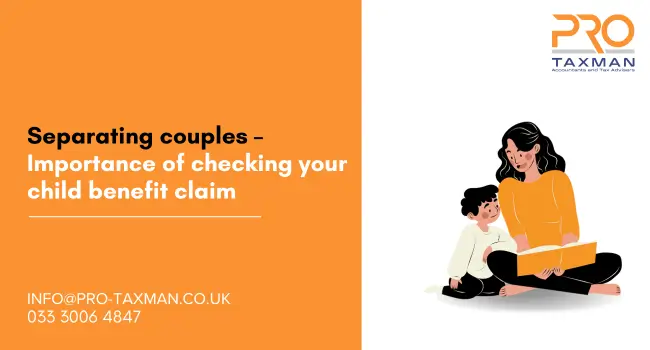The High-Income Child Benefit Charge (HICBC) is a tax charge that claws back child benefit where the claimant or his or her partner have adjusted net income of at least £50,000. Where both parties have income in excess of this, the charge is levied on the partner with the highest income.
The charge is equal to 1% of the child benefit paid for the tax year for every £100 by which adjusted net income exceeds £50,000. Once adjusted net income reaches £60,000, the charge is equal to the child benefit for the tax year.
To avoid receiving a benefit that has to be paid back, a couple may elect not to receive the benefit. However, it is important to claim it to access the associated National Insurance credits, particularly where the claimant’s income is not sufficient for the year to be a qualifying year for state pension purposes.
Check who is the claimant
For child benefit purposes, the claimant may not be the person who actually receives the child benefit – HMRC regard the claimant as the person who signs the claim form. The claimant can elect for the benefit to be paid to someone else, for example, a husband may complete the form and sign it, but elect for the child benefit in respect of their child to be paid to his wife. While a couple remain together, this may not matter. However, if a couple separate, it is important to be clear which partner is the claimant to avoid unnecessary and unexpected tax charges.
The Meades case
A recent case highlighted the importance of checking child benefit claims on separation.
In 2021, HMRC issued Mr Meades with an amendment to his 2019/20 tax return on the basis that he was liable for the HICBC for that year.
Mr Meades married his former wife in 2010. In 2012, he claimed child benefit in respect of their child, electing for the benefit to be paid to his ex-wife (the child’s mother). The couple separated in July 2017 and the marriage was dissolved on 4 April 2019. Mr Meades provided financial support to his former wife and met household bills. Mr Meades remarried in November 2019. He lived with his new wife as a married couple throughout 2019/20.
The couple did not revise their child benefit claim on separation. Consequently, Mr Meades remained the claimant. As he provided financial support for his child, he was entitled to claim the benefit. The tribunal found that HMRC were right to assess him for the HICBC for 2019/20 as he was the claimant and his income exceeded £50,000. It did not matter that the benefit was paid to his ex-wife.
Lessons
On separation, it is advisable to review child benefit claims to check who is the claimant. Mr Meades would not have been liable for the HICBC after he separated from his ex-wife had she been the claimant as he would have been neither the claimant nor the claimant’s partner. Had the couple reviewed their claim and realised this, Mr Meades could have ended his claim and a new claim could have been made by the child’s mother. This would have prevented him from being liable to the charge. It would also have prevented Mr Meades’ new partner from a potential liability to the charge in respect of the benefit paid to his ex-wife, which would have been the case had her income been both more than £50,000 and higher than that of Mr Meades – as they lived together as a married couple throughout 2019/20, she was potentially liable for the charge as the claimant’s partner.
Need professional accounting service or tax advice? Contact us to book a 15-min Free Consultation with us today.
To find out more please follow us on Facebook, Twitter, or LinkedIn. Feel free to contact us on 0333 006 4847 or request a call back by texting 075 6464 7474

